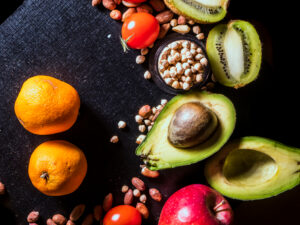Benefits of Fiber

By: Shaylyn Tinari, MS, RD, LDN
Let’s be honest, carbohydrates have a bad reputation. The south beach diet, Atkins diet, no-carb, low carb, keto, are just a few to name that put an emphasis around cutting out or limiting carbohydrates. Did you know that there are healthy parts to carbohydrates?
Fiber is a type of carbohydrate that the body does not digest. Sounds weird, right? Typically, carbohydrates are broken down into sugar molecules to be utilized for energy or stored as glycogen in the liver or muscle for later usage. Since fiber cannot be broken down it passes through the body undigested. This is great for several reasons.
- Keeps you full and satisfied. Whether you’re trying to lose weight or just maintain your weight, feeling full and satisfied is key! One of the great reasons we eat is to give our bodies energy and satisfy hunger. Not all foods do the latter. Incorporating fiber at each meal can help you cut back on portion sizes and even help those late afternoon cravings!
- Regulates blood sugar levels. This is especially helpful for someone who has type 2 diabetes, prediabetes, or is at risk for either. Because our bodies do not digest fiber, fiber can prevent spikes in blood sugar levels. Preventing spikes in blood sugar levels can prevent the sluggishness you may feel after eating a high carb snack or meal without any fiber such as bagels, desserts, pizza, white rice, or white bread.
- Lowers blood cholesterol. Believe it or not, only 20% of the cholesterol in your bloodstream comes from the food you eat which means 80% is made by the body. Cholesterol is needed to make hormones and digest fatty foods. When you have high cholesterol levels, you have more cholesterol in your bloodstream than is needed. Having high cholesterol raises your risk of heart disease, the leading cause of death, and a stroke, the fifth leading cause of death. Soluble fiber, one of two types of fiber, can lower cholesterol levels by binding excess cholesterol and excreting it from the body. Yay teamwork!
Constipation is the most common gastrointestinal complaint in the United States.
- Promotes regular bowel movements. Having regular bowel movements prevents constipation. Constipation is the most common gastrointestinal complaint in the United States. Believe it or not, fiber has been shown to relieve and prevent constipation. Insoluble fiber, the second type of fiber, does not dissolve in water which means it does not change when liquid is added to it. This helps food move through your digestive system, bulk up to form stool, and get excreted from the body.
- Reduces your risk for several diseases. High intake of fiber has been linked to a lower risk of heart disease, type 2 diabetes, diverticular disease, certain types of cancers, and a lower risk of metabolic syndrome, which includes high blood pressure, high insulin levels, excess weight, high triglycerides, and low levels of HDL (good) cholesterol.
Now that you know what fiber is and why it is beneficial to your health, let’s discuss where you can find it. Luckily there are many great ways to incorporate fiber into your diet!
Starchy Vegetables
Sweet potato
White potato
Beans including navy beans, white beans, chickpeas, pinto beans, black beans, soybeans and red kidney beans
Whole Grains
High fiber bran cereal
Whole grain pasta
Whole grain bread (i.e. brands to choose Arnold’s 100% whole wheat, Dave’s Killer Bread, Food For Life® Ezekiel Sprouted)
Quinoa
Farro
Oatmeal
High fiber pasta, rice, and mac and cheese (Brand: Banza®)
Popcorn
Vegetables
Artichoke
Carrots
Collard greens
Green peas
Mixed vegetables
Parsnip
Split peas
Fruits
Apple
Avocado
Banana
Blueberry
Cranberry
Orange
Pear
Raspberry
Healthy Fats
Nuts (i.e. pistachios, peanuts, hazelnuts, pecans, almonds, walnuts)
Seeds (i.e. chia, flax, pumpkin, sunflower)
The daily fiber recommendation for women is to consume at least 25g whereas men is 38g. On average adults in the US are consuming about 50% of the recommended fiber needs. Finding it difficult to incorporate more fiber into your diet? Contact the dietitians at Yummy Body Nutrition – we can help!
References:
- https://www.cdc.gov/cholesterol/facts.htm
- https://www.health.harvard.edu/heart-health/how-its-made-cholesterol-production-in-your-body
- https://www.joslin.org/info/how_does_fiber_affect_blood_glucose_levels.html
- https://health.gov/dietaryguidelines/2015/guidelines/appendix-13/
- https://www.hsph.harvard.edu/nutritionsource/carbohydrates/fiber/
- https://wholegrainscouncil.org/whole-grains-101/whats-whole-grain-refined-grain
- https://www.choosemyplate.gov/grains-group-food-gallery